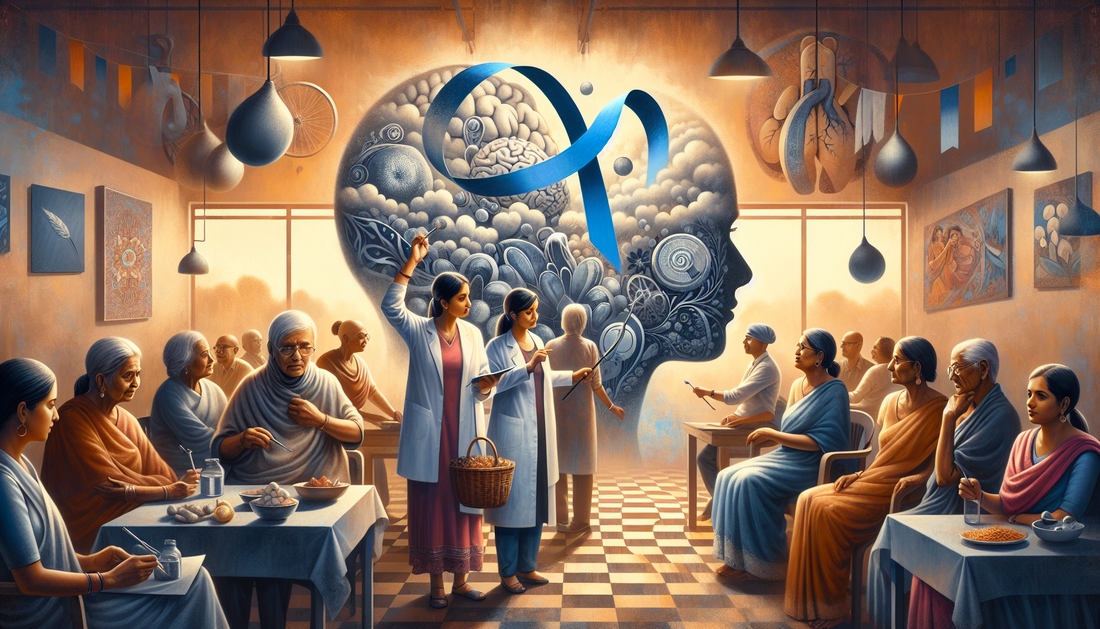
Alarming Mental Health Crisis Among Diabetics in India
Heath Wells HealthShare
The increasing mental health crisis among diabetics in India has raised significant concern. Research and health reports highlight an alarming trend affecting millions.
- The prevalence of mental health issues like depression and anxiety among diabetics has surged, impacting their overall quality of life. 📉
- Key locations, such as urban centers like Delhi and Mumbai, report higher cases due to lifestyle and stress factors. 🏙️
- Dr. Aarti Sharma from New Delhi notes that nearly 40% of diabetic patients experience mental health challenges, necessitating urgent action. 🩺
- October 10, 2023: A national health survey reveals that socio-economic factors exacerbate mental health issues in diabetes patients. 📊
- Initiatives from NGOs and health bodies in the past year strive to provide mental health support specifically tailored for diabetics. 🤝
- Health professionals urge for integrated treatment plans addressing both diabetes and mental well-being. ⚕️
This crisis calls for heightened awareness and better mental health care facilities tailored for diabetics across India. Increased concern and proactive measures are urgently required to address this critical issue.
In an alarming revelation, a recent report published in the esteemed Shillong Times indicates that an overwhelming 86% of individuals with diabetes in India are grappling with mental health issues such as anxiety and depression. This high prevalence is a cause for concern and calls for immediate action to address the mental and physical health needs of this demographic. Notably, the report highlights that women are disproportionately affected, underscoring the need for gender-sensitive approaches in healthcare interventions.
A deep dive into the data unveils a grim reality for the diabetic community across the vast expanse of India. The intricate relationship between diabetes and mental health is not just a matter of medical intricacies but also a reflection of the socio-economic challenges faced by individuals. Patients in metropolitan areas like Mumbai and Delhi, known for their high-paced lifestyles and stress-inducing environments, report higher anxiety levels compared to those in smaller towns.
Leveraging the information from the report, it becomes evident that mental health professionals and endocrinologists must collaborate more closely to provide comprehensive care. The presence of an integrated healthcare approach in cities like Bangalore, where mental health and diabetes clinics work in sync, should be hailed as a model for other regions.
Understanding the Diabetes and Mental Health Connection
Diabetes is a chronic condition that affects millions in India, altering their lifestyle and imposing significant stress. It is no surprise that the burden of diabetes can lead to mental health complications. Doctors across India, like Dr. Anjali Menon in Chennai, have observed higher rates of mental health issues among their diabetic patients.
Several factors contribute to this phenomenon: the relentless demand to manage diabetes effectively, fear of complications like neuropathy or kidney damage, and financial pressures due to continuous medical expenses. This multifaceted problem is not just a personal health crisis but a public health emergency demanding systemic solutions.
Impact on Women with Diabetes
The report further throws light on the skewed impact of these challenges on women. Biological, social, and psychological inequalities play substantial roles. Many women, already shouldering societal expectations and responsibilities, find it harder to manage their condition. Patriarchal societal setups in rural parts of India exacerbate these challenges, with women having lesser access to health resources and support systems.
Dr. Pallavi Shetty, a psychiatrist based in Pune, highlights that women often prioritize family needs over their health, delaying necessary interventions and care for their diabetes and mental health. Initiatives focused on empowering women through education and access to healthcare are urgently needed to bridge these gaps.
Chronology of Events Leading to the Current Scenario
Diabetes has been on the rise in India for several decades. According to the Indian Council of Medical Research, cases showed a steady increase from the 1990s. As the prevalence of the disease soared, so did the associated mental health issues. Initial reports in the early 2000s hinted at the co-existence of depression among diabetics, but it wasn't until the 2010s that comprehensive studies began quantifying this trend.
Fast forward to November 2024, the Shillong Times report crystallizes years of anecdotal evidence into a stark statistic: 86% of Indian diabetics today face anxiety and depression. This revelation is a result of continuous data collection and analysis by health bodies and NGOs committed to improving diabetic care in India.
Future Directions: Integrated Care and Awareness
The path forward demands a holistic approach towards diabetic care, where psychological health receives equal emphasis as physical health. Initiatives like the Diabetes Distress online forums, prominent in cities like Hyderabad, represent a step in the right direction, providing a platform for patients to share experiences and seek support.
Moreover, awareness campaigns led by local NGOs in states like Kerala aim to educate the masses on the importance of mental well-being in diabetes management. These campaigns encourage the acceptance of mental health issues and advocate for regular mental health check-ups as part of diabetes management protocols.
Role of Healthcare Infrastructure and Policy Intervention
The healthcare infrastructure in India needs significant bolstering to address this dual crisis. Governmental policies must pivot towards providing accessible and affordable mental health services in tandem with diabetes care. Current systems, often overburdened and under-equipped, especially in rural areas, must be upgraded to accommodate these changes.
Private healthcare should also step up by integrating mental health services within diabetic care frameworks. Hospitals like Apollo and Fortis have begun exploring such models, but widespread adoption across other private entities is crucial.
In conclusion, while the Shillong Times' report shines a light on a dire issue, it also paves the way for a mobilized response that could transform diabetic care in India. The intertwined battle with diabetes and mental health is winnable, but it requires collective action, awareness, and strategic healthcare reforms.











